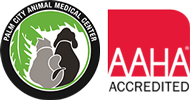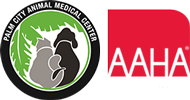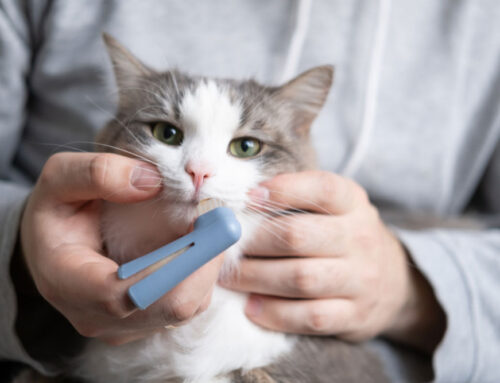Your pet’s bright and healthy smile lights the room and indicates you are providing them with excellent oral hygiene. Pet ownership comes with many joys and responsibilities, and one crucial aspect of caring for your furry friend is maintaining their dental health. Without proper care, however, those pearly whites can become not-so-nice and cause dental diseases that can be avoided. Our Palm City Animal Medical Center team explains why your pet’s oral hygiene and dental care are essential.
Pet dental health facts
Dental health is not just about fresh breath; it’s a key component of your pet’s overall well-being. Inadequate dental care can lead to painful conditions, such as periodontal disease that can affect your pet’s teeth, organs, such as their heart and liver, and overall health. Untreated dental problems cause pain and discomfort, eating difficulties and subsequent weight loss, and myriad health problems. By prioritizing your pet’s dental health and daily oral hygiene, you can help them live a happy, healthy life.
Dental disease signs in pets
Recognizing your furry companion’s dental and general health signs can be challenging because pets often hide their vulnerabilities. However, your pet may have dental problems if they exhibit any of the following signs:
- Bad breath (i.e., halitosis)
- Red, inflamed, or bleeding gums
- Difficulty chewing
- Favoring one side of the mouth while eating
- Drooling
- Pawing at their face or mouth
- Loose, fractured, or missing teeth
- Changes in behavior (e.g., hiding, lethargy, disinterest in activities)
If your pet exhibits any of these signs, contact our veterinary team. We will perform a dental exam and recommend appropriate treatment.
Practical tips for excellent pet dental health
Although you are aware that pets need regular dental care, you may wonder what this entails. Being proactive about your four-legged friend’s oral hygiene, nutritional needs, and veterinary exams contributes to long-lasting vitality and disease prevention. To keep your pet’s teeth and gums in tip-top shape, follow these tips:
- Regular toothbrushing — Daily toothbrushing is instrumental in keeping plaque and tartar from forming and damaging your cat’s or dog’s teeth. Daily toothbrushing is most effective, but brushing every other day, at minimum, is also effective. Use a toothbrush and toothpaste specifically designed for pets. Do not use your toothpaste on your furry pal’s teeth, as the ingredients are toxic to pets.
Brushing your pet’s teeth may be an intimidating chore, which is why you should start gradually. Focus first on your furry pal’s front teeth (i.e., incisors) to acclimate your pet to the feel of the toothbrush. When your pet becomes comfortable with this, brush the front, sides, and insides of the teeth, remembering to gently brush the gums. Reward your pet by giving them a favorite treat and plenty of praise for a job well done. - Dental examinations — Schedule routine dental checkups with your Palm City Animal Medical Center veterinarian to stay on top of your pet’s dental health. During the exam, we will assess your fur pal’s oral health and address any issues we detect. Pets require professional dental cleanings performed under anesthesia to eliminate plaque and tartar on their teeth. During this time, we also take digital dental X-rays that allow us to see what’s occurring below the gumline, including bone loss and periodontal dental pockets.
- Dental toys — Chewing is as natural to a dog as is wagging their tails. Chewing provides mental enrichment and can also help keep your pet’s teeth clean by scraping away plaque. Look for sturdy toys that are designed to promote dental health and always supervise your pet while they chew, making sure the toy is large enough to prevent your pet from swallowing the item.

- Dental treats — The Veterinary Oral Health Council (VOHC) is instrumental in determining which dental chews and treats are safe and effective. Look for the VOHC seal on treat packaging to ensure you are feeding your fur pal the most effective dental chews available. Treats formulated to support dental health can be a tasty way to maintain your pet’s oral hygiene, but be mindful of the amount you feed your furry pal. All treats, no matter how healthy, have calories and they should make up no more than 10% of your pet’s daily calorie intake.
- Nutritious food — A healthy diet contributes to your pet’s overall well-being, including their dental health. Provide your pet with high-quality food and avoid giving them table scraps or sugary snacks, because they can lead to dental problems. Our team can recommend the healthiest diet for your pet’s dental and overall health needs.
Taking care of your pet’s dental health is an important part of being a responsible pet owner. You can help prevent dental issues and ensure your furry friend enjoys a lifetime of happy smiles by being proactive about their oral hygiene. Our Palm City Animal Medical Center team provides excellent dental care, so schedule your pet’s dental consultation and exam with us.








Leave A Comment